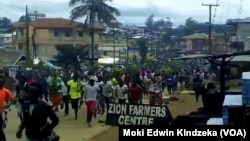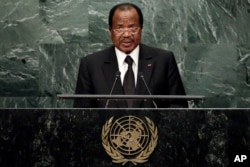About 700 pro-independence protesters — mostly youths — are attacking government buildings and police stations at the Cameroonian border town of Ekok, and hoisting what they call the flag of their independent state of Ambazonia.
Elias Tambe, a leader of the separatists, says they no longer recognize Cameroon president Paul Biya as their leader.
"He is nobody and he will never mean anything to the Ambazonians," said Tambe, 27. "This is the border between Southern Cameroon and the Republic of Nigeria at the frontier Ekok. You can see the flags, you can see the flags, this is the border. Now they have closed the border, they don't want us to cross to Nigeria, but we are there. Biya must go."
Members of the group tried to cross over to the Nigeria border state of Enugu to inform authorities there that a new nation has been born, but were blocked by Nigeria immigration police.
The separatists promised to declare their independence on October 1, and have appointed Julius Ayuk Tabe, who is in exile, as their interim leader.
In response, Cameroon has deployed thousands of troops to the English-speaking northwest and southwest regions to stop all demonstrators. However, observers say the separatists may be relocating to smaller localities such as Ekok where the military is not yet present.
French-speaking Cameroonian Debong Ignatius says the presence of the military can exacerbate the crisis.
"Men in uniform and the police circled our neighborhoods, entered the various houses, insisting that people should bring out Ambazonina flags they were hiding," Debong said. "I do not think it is their duty to go harassing people at this precise moment because it can exacerbate the situation."
President Biya has told English-speaking ministers and senior state functionaries working in Yaounde to go home, in an effort to urge the population not to accept separatists' ideas.
Fame Ndongo, communication secretary of the ruling CPDM party, says party officials were dispatched to encourage supporters to rally on Saturday and Sunday as a sign of disapproval and condemnation of violence and anti-constitutional acts perpetrated by secessionist groups.
Schools have been closed in the English-speaking northwest and southwest since November, when lawyers and teachers called for a strike to stop what they believe is the overuse of the French language.
Leaders of the strike were arrested, but pressure groups have been calling for their immediate and unconditional release. Fifty-five of the 75 protesters were released, and charges against them were dropped.
While separatists are calling for complete independence, Biya has said he is not open to any negotiation on the matter and that Cameroon is one and indivisible.





